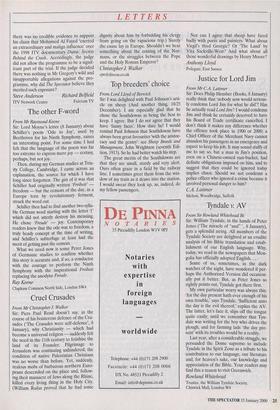The other F-word
From Mr Raymond Keene Sir: Lord Moyne's letter (8 January) about Schiller's poem 'Ode to Joy', used by Beethoven for his Ninth Symphony, raises an interesting point. For some time I had felt that the language of the poem was far too extreme to express mere joy — ecstasy, perhaps, but not joy. Then, during my German studies at Trin- ity College, Cambridge, I came across an explanation, the source for which I have long since forgotten. The gist of it was that Schiller had originally written Treiheit' — freedom — but the censors of the day, in a Europe torn by revolutionary ferment, struck the word out.
Schiller then had to find another two-sylla- ble German word starting with the letter 1 ' which did not utterly destroy his meaning. He chose Trade' — joy. Contemporary readers knew that the ode was to freedom, a truly heady concept at the time of writing, and Schiller's subterfuge at least had the merit of getting past the censors. What we need now is some Peter Jones of Germanic studies to confirm whether this story is accurate and, if so, a conductor with the courage to perform the Ninth Symphony with the inspirational Fret/wit replacing the anodyne Freude.
Ray Keene
Clapham Common North Side, London SW4


























































 Previous page
Previous page